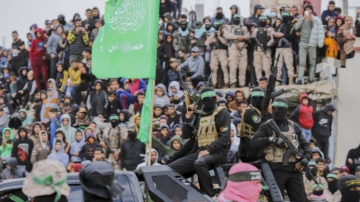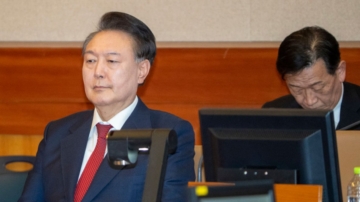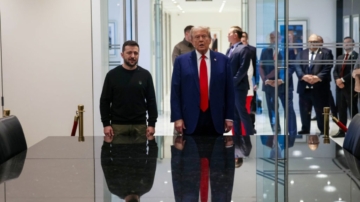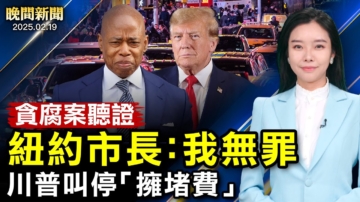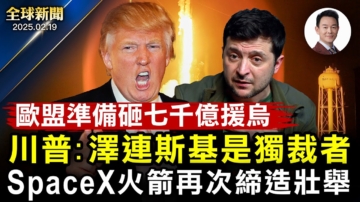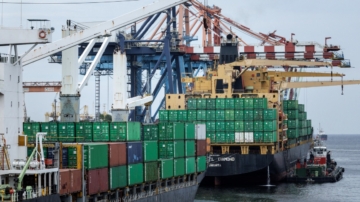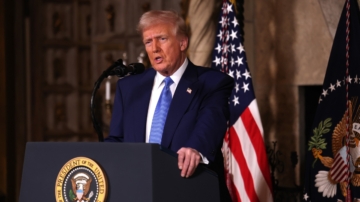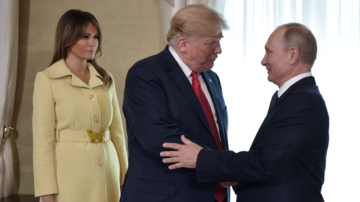【新唐人2014年02月11日讯】俄罗斯索契“冬季奥运会”日前开幕,这是苏联解体后,俄罗斯首次举办的奥运会,但是西方几个大国领袖缺席了开幕式,而中共领导人习近平,和日本首相安倍晋三,却高调出席,竞相拉拢俄罗斯总统普京。本届“冬奥会”台面下的外交角力,似乎成为体育比赛之外的主要看点。
6号中午,习近平飞抵俄罗斯索契,这是中共最高领导人第一次出席由其他国家主办的大型体育赛事。当天下午,习近平与普京举行会晤,习近平向普京表示,中、俄是好伙伴、好邻居、好朋友。
中国国际问题研究所欧亚研究部副主任李自国:“习近平接受采访时已经表示了,邻居在办喜事,我要前来祝贺。另外,中、俄是一个战略性的伙伴关系,这里边肯定是除了要参加奥运会之外,还有进一步强化中、俄战略性关系的目地。”
台湾政治大学国际关系研究中心主任丁树范:“美、中关系虽然彼此在尽量改善,可是美、中毕竟某种程度还是处于竞争的状态,加上美、日安保,中国可能会认为,美国对它还是采取不太友好的一个态度。所以中国想要跟俄罗斯保持一些密切来往,来平衡一下美国以及美、日安全联盟的关系吧。”
日本首相安倍晋三也在7号前往索契会见普京。这一次索契“冬奥会”,美国总统欧巴马、英国首相卡麦隆、法国总统欧兰德和德国总统高克,都没有出席。安倍成为这次冬奥会上支持普京的主要国家领导人。
丁树范:“西方本来是期待俄罗斯进入后冷战以后,会有很大的改变,走向更开放,可是普京的做法很明显跟西方的做法不一样,所以有人把这次的冬季奥运会跟1980年夏季莫斯科奥运会来做个对比,也因此西方媒体对于这次冬季奥运、乃至于普京,呈现相当负面的报导。”
为营造友好气氛,普京带上了安倍两年前赠送给他的那只日本秋田犬,在官邸门前迎接安倍的到来。普京还称赞日、俄两国的关系在迅速发展。安倍也表示,日本的导弹防御系统不会针对俄罗斯。
据了解,今年6月4号,索契将举行8国集团峰会,到时,普京和安倍还将再次会晤。而今年秋季,普京也将对日本进行正式访问。
中、日两国领导人竞相拉拢普京,那么,俄罗斯在其中扮演甚么角色呢?
美国华盛顿特区的“美利坚大学”亚洲研究中心教授赵全胜,在《美国之音》《海峡论坛》节目中表示,习近平上任以来第一个出访的国家就是俄罗斯,突显了中共希望与俄罗斯加深关系,而安倍也希望在北方四岛领土主权问题上取得突破。赵全胜表示,俄罗斯这个外交老手,当然希望左右逢源,藉机将国家的利益最大化。
丁树范:“这一次在冬季奥运会,普京受到西方满多的抵制,在这个时候,有习近平国家主席去访问俄罗斯,参加冬季奥运会,普京心理上可能会感觉满温暖的吧,可是到底俄罗斯会不会卖中国所需要的Su- 35战斗机,这可能是另外一回事。”
俄罗斯副外长莫尔古洛夫,日前参加了在东京举行的俄、日缔结和平条约,和领土问题的有关谈判。据了解,这是两国领导人为了推动双边关系,所建立的新对话机制。
李自国:“俄、日之间有共同的利益诉求,那就是说经济上有合作的诉求,但是呢,如果是参杂到领土的问题,这个合作就难以开展。这在过去的几十年,已经非常明显的表现出来了。”
不过,俄罗斯媒体和许多政治分析人士表示,考虑到俄罗斯对中共的戒心,以及俄、日两国共同面临的来自中共的威胁,俄、日双方可以跳过领土问题,发展关系。
俄罗斯官员曾公开表示,绝不允许中国城在俄罗斯出现。相反的,日本福岛发生核事故之后,俄罗斯一些政治人物甚至欢迎日本人移民定居远东和西伯利亚。而一些经济分析师也表示,在能源合作方面,俄罗斯大企业更愿意吸引日本投资,并与日本组建合资企业。
采访/常春 编辑/陈洁 后制/陈建铭
Sochi: China and Japan Compete to Win Support of Russia
The Sochi Winter Olympics is the first Olympic Games
that Russia has hosted since the demise of Soviet Union.
With major Western leaders absent, Chinese leader
Xi Jinping and Japanese Prime Minister Shinzo Abe
became the main support to Russia President Putin.
Diplomatic wrangling during this Winter Olympics
has become the focus outside of the sports arena.
On the noon of February 6, Xi Jinping arrived in Sochi.
This marks the first major international sports event
that the Communist regime leader has ever attended.
Xi Jinping met President Putin, and called Russia
a “good neighbor, good partner, and good friend.”
Li Ziguo, Deputy Director, Department for European-Central
Asian Studies, China Institute of International Studies:
“Xi Jinping has equated his visit to Russia for the Olympics
to that of congratulating a neighbor on a happy occasion.
In fact, China and Russia are strategic partners.
The visit to Sochi is definitely more
than one of friendships and Games.”
Arthur Ding, Director, Institute of International Relations,
National Chengchi University: “Even though US-China
relations are improving, they’re still in a state of competition.
With a US-Japan security alliance,
China still has doubt about the US.
China is hoping to balance its relationship with
the United States and the US-Japan alliance.
It seeks to do this through close contact with Russia.”
Japanese PM Shinzo Abe also visited Putin on February 7.
With the absence of U.S. President Barack Obama,
British PM David Cameron, French President Hollande
and German President Gauck, Abe became the main
national leader supporting Putin's Winter Olympics.
Arthur Ding: “After the Cold War, the West had hoped for
Russia to undergo big changes, and become more open.
However, Putin's approach has been
evidently to deviate from the West.
Many compared this Olympic Games
to the 1980 Moscow Olympics.
Even media have produced considerable
negative coverage of the Sochi Olympics.”
To welcome Abe, Putin brought his Akita Inu,
a pet gift from PM Shinzo Abe two years ago.
Putin praised the improvement in Russia and Japan relations.
Abe commented that Japan’s missile
defenses are not aimed against Russia.
It is understood that Abe will see Putin again at a summit
of the Group of Eight industrial powers in Sochi on June 4.
Putin will also pay an official visit to Japan later this year.
Both China and Japan are competing for
Putin’s support, but what role is Russia playing?
Zhao Quansheng, Director, Center for Asian
Studies, American University, Washington DC
commented on this issue to Voice of America.
Xi Jinping’s first official visit to Russia as a leader shows
the CCP’s desire to strengthen relationships with Russia.
Additionally, Abe also hopes to breakthrough on
the issue of the islands northeast of Hokkaido.
Zhao Quansheng further indicated that Russia,
a diplomatic veteran, is certainly hoping to grasp
opportunities to maximize interests for the country.
Arthur Ding: “Putin received high levels of boycotting
by major Western leaders during this Winter Olympics.
Putin certainly felt comforted by Xi Jinping’s visit.
However, does that mean Russia will sell the
Su-35 jet fighter to China? That’s a different matter.”
On a visit to Tokyo, Russian Deputy Foreign
Minister Igor Morgulov discussed signing
of a peace treaty between Russia and Japan.
Accordingly, this is an implementation
of agreements reached by the two sides.
This is to further develop
Russian-Japanese co-operation.
Li Ziguo: “There is a mutual demand between
Russia and Japan for this cooperation.
However, once a territory issue is involved,
the cooperation is harder to proceed with.
This has been obvious during the past few decades.”
However, considering the threat from China, Russian
media, and many political analysts, have reportedly
said that both Russia and Japan can bypass the
issue of territory, to develop relevant cooperation.
Russian officials have said publicly that a China
Town will never be allowed to appear in Russia.
In contrast, after Japan’s Fukushima nuclear accident,
some Russian politicians even welcomed Japanese
immigrants to settle in the Far East region and Siberia.
Some economic analysts also said that in terms of energy
co-operation, Russia's big companies are more willing to
attract Japanese investment, and joint ventures with Japan.
Interview/ChangChun Edit/ChenJie Post-Production/Chen Jianming
6号中午,习近平飞抵俄罗斯索契,这是中共最高领导人第一次出席由其他国家主办的大型体育赛事。当天下午,习近平与普京举行会晤,习近平向普京表示,中、俄是好伙伴、好邻居、好朋友。
中国国际问题研究所欧亚研究部副主任李自国:“习近平接受采访时已经表示了,邻居在办喜事,我要前来祝贺。另外,中、俄是一个战略性的伙伴关系,这里边肯定是除了要参加奥运会之外,还有进一步强化中、俄战略性关系的目地。”
台湾政治大学国际关系研究中心主任丁树范:“美、中关系虽然彼此在尽量改善,可是美、中毕竟某种程度还是处于竞争的状态,加上美、日安保,中国可能会认为,美国对它还是采取不太友好的一个态度。所以中国想要跟俄罗斯保持一些密切来往,来平衡一下美国以及美、日安全联盟的关系吧。”
日本首相安倍晋三也在7号前往索契会见普京。这一次索契“冬奥会”,美国总统欧巴马、英国首相卡麦隆、法国总统欧兰德和德国总统高克,都没有出席。安倍成为这次冬奥会上支持普京的主要国家领导人。
丁树范:“西方本来是期待俄罗斯进入后冷战以后,会有很大的改变,走向更开放,可是普京的做法很明显跟西方的做法不一样,所以有人把这次的冬季奥运会跟1980年夏季莫斯科奥运会来做个对比,也因此西方媒体对于这次冬季奥运、乃至于普京,呈现相当负面的报导。”
为营造友好气氛,普京带上了安倍两年前赠送给他的那只日本秋田犬,在官邸门前迎接安倍的到来。普京还称赞日、俄两国的关系在迅速发展。安倍也表示,日本的导弹防御系统不会针对俄罗斯。
据了解,今年6月4号,索契将举行8国集团峰会,到时,普京和安倍还将再次会晤。而今年秋季,普京也将对日本进行正式访问。
中、日两国领导人竞相拉拢普京,那么,俄罗斯在其中扮演甚么角色呢?
美国华盛顿特区的“美利坚大学”亚洲研究中心教授赵全胜,在《美国之音》《海峡论坛》节目中表示,习近平上任以来第一个出访的国家就是俄罗斯,突显了中共希望与俄罗斯加深关系,而安倍也希望在北方四岛领土主权问题上取得突破。赵全胜表示,俄罗斯这个外交老手,当然希望左右逢源,藉机将国家的利益最大化。
丁树范:“这一次在冬季奥运会,普京受到西方满多的抵制,在这个时候,有习近平国家主席去访问俄罗斯,参加冬季奥运会,普京心理上可能会感觉满温暖的吧,可是到底俄罗斯会不会卖中国所需要的Su- 35战斗机,这可能是另外一回事。”
俄罗斯副外长莫尔古洛夫,日前参加了在东京举行的俄、日缔结和平条约,和领土问题的有关谈判。据了解,这是两国领导人为了推动双边关系,所建立的新对话机制。
李自国:“俄、日之间有共同的利益诉求,那就是说经济上有合作的诉求,但是呢,如果是参杂到领土的问题,这个合作就难以开展。这在过去的几十年,已经非常明显的表现出来了。”
不过,俄罗斯媒体和许多政治分析人士表示,考虑到俄罗斯对中共的戒心,以及俄、日两国共同面临的来自中共的威胁,俄、日双方可以跳过领土问题,发展关系。
俄罗斯官员曾公开表示,绝不允许中国城在俄罗斯出现。相反的,日本福岛发生核事故之后,俄罗斯一些政治人物甚至欢迎日本人移民定居远东和西伯利亚。而一些经济分析师也表示,在能源合作方面,俄罗斯大企业更愿意吸引日本投资,并与日本组建合资企业。
采访/常春 编辑/陈洁 后制/陈建铭
Sochi: China and Japan Compete to Win Support of Russia
The Sochi Winter Olympics is the first Olympic Games
that Russia has hosted since the demise of Soviet Union.
With major Western leaders absent, Chinese leader
Xi Jinping and Japanese Prime Minister Shinzo Abe
became the main support to Russia President Putin.
Diplomatic wrangling during this Winter Olympics
has become the focus outside of the sports arena.
On the noon of February 6, Xi Jinping arrived in Sochi.
This marks the first major international sports event
that the Communist regime leader has ever attended.
Xi Jinping met President Putin, and called Russia
a “good neighbor, good partner, and good friend.”
Li Ziguo, Deputy Director, Department for European-Central
Asian Studies, China Institute of International Studies:
“Xi Jinping has equated his visit to Russia for the Olympics
to that of congratulating a neighbor on a happy occasion.
In fact, China and Russia are strategic partners.
The visit to Sochi is definitely more
than one of friendships and Games.”
Arthur Ding, Director, Institute of International Relations,
National Chengchi University: “Even though US-China
relations are improving, they’re still in a state of competition.
With a US-Japan security alliance,
China still has doubt about the US.
China is hoping to balance its relationship with
the United States and the US-Japan alliance.
It seeks to do this through close contact with Russia.”
Japanese PM Shinzo Abe also visited Putin on February 7.
With the absence of U.S. President Barack Obama,
British PM David Cameron, French President Hollande
and German President Gauck, Abe became the main
national leader supporting Putin's Winter Olympics.
Arthur Ding: “After the Cold War, the West had hoped for
Russia to undergo big changes, and become more open.
However, Putin's approach has been
evidently to deviate from the West.
Many compared this Olympic Games
to the 1980 Moscow Olympics.
Even media have produced considerable
negative coverage of the Sochi Olympics.”
To welcome Abe, Putin brought his Akita Inu,
a pet gift from PM Shinzo Abe two years ago.
Putin praised the improvement in Russia and Japan relations.
Abe commented that Japan’s missile
defenses are not aimed against Russia.
It is understood that Abe will see Putin again at a summit
of the Group of Eight industrial powers in Sochi on June 4.
Putin will also pay an official visit to Japan later this year.
Both China and Japan are competing for
Putin’s support, but what role is Russia playing?
Zhao Quansheng, Director, Center for Asian
Studies, American University, Washington DC
commented on this issue to Voice of America.
Xi Jinping’s first official visit to Russia as a leader shows
the CCP’s desire to strengthen relationships with Russia.
Additionally, Abe also hopes to breakthrough on
the issue of the islands northeast of Hokkaido.
Zhao Quansheng further indicated that Russia,
a diplomatic veteran, is certainly hoping to grasp
opportunities to maximize interests for the country.
Arthur Ding: “Putin received high levels of boycotting
by major Western leaders during this Winter Olympics.
Putin certainly felt comforted by Xi Jinping’s visit.
However, does that mean Russia will sell the
Su-35 jet fighter to China? That’s a different matter.”
On a visit to Tokyo, Russian Deputy Foreign
Minister Igor Morgulov discussed signing
of a peace treaty between Russia and Japan.
Accordingly, this is an implementation
of agreements reached by the two sides.
This is to further develop
Russian-Japanese co-operation.
Li Ziguo: “There is a mutual demand between
Russia and Japan for this cooperation.
However, once a territory issue is involved,
the cooperation is harder to proceed with.
This has been obvious during the past few decades.”
However, considering the threat from China, Russian
media, and many political analysts, have reportedly
said that both Russia and Japan can bypass the
issue of territory, to develop relevant cooperation.
Russian officials have said publicly that a China
Town will never be allowed to appear in Russia.
In contrast, after Japan’s Fukushima nuclear accident,
some Russian politicians even welcomed Japanese
immigrants to settle in the Far East region and Siberia.
Some economic analysts also said that in terms of energy
co-operation, Russia's big companies are more willing to
attract Japanese investment, and joint ventures with Japan.
Interview/ChangChun Edit/ChenJie Post-Production/Chen Jianming

